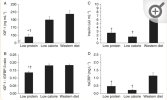Jackedjack
Member
Interesting study comparing Calorie restriction with Protein restriction and effects on IGF 1 levels.
Seems that protein restriction has much more effect on lowering IGF than calorie restriction.
Im always searching reasons and answers for my low response to exogenous HGH to IGF1 conversion.
Any experience changing dietary protein amounts and its effects on IGF levels?
Me personally always have been moderate to low protein guy. Mostly always below 1g/lbs protein. Maybe thats the reason for my shitty IGF levels on different HGH brands.
Discuss.
 www.ncbi.nlm.nih.gov
www.ncbi.nlm.nih.gov
Seems that protein restriction has much more effect on lowering IGF than calorie restriction.
Im always searching reasons and answers for my low response to exogenous HGH to IGF1 conversion.
Any experience changing dietary protein amounts and its effects on IGF levels?
Me personally always have been moderate to low protein guy. Mostly always below 1g/lbs protein. Maybe thats the reason for my shitty IGF levels on different HGH brands.
Discuss.
These data provide evidence that, in contrast to the decrease in IGF-1 in rodents, a reduction of IGF-1 expression is not a component of the adaptive response to long-term CR in humans. On the other hand, fasting for 10 days markedly reduces serum IGF-1 concentration into the range observed for growth hormone-deficient patients (Thissen et al., 1994). Moreover, the changes of serum IGF-1 during fasting and refeeding are closely correlated with the rate of excretion of urinary urea, a marker of nitrogen balance and protein intake (Clemmons et al., 1981
It also seemed possible that the CR groups’ rather high protein intake (~24% of the calories from protein; 1.73 g kg−1 per day of protein) may have prevented a reduction in IGF-1 level. As a first step in evaluating this possibility we were able to arrange for six of the CR volunteers to reduce their protein intake from 1.67 ± 0.1 g kg−1 of body weight per day to a protein intake of 0.95 ± 0.1 g kg−1 of body weight per day for 3 weeks. This short-term isocaloric reduction of protein intake resulted in a 25% reduction in serum IGF-1 concentration (from 194 ± 34 ng mL−1 to 152 ± 41 ng mL−1; p = 0.01) in the six CR individuals, suggesting that the high protein intake was preventing a reduction in IGF-1 levels
Long-term effects of calorie or protein restriction on serum IGF-1 and IGFBP-3 concentration in humans - PMC
Reduced function mutations in the insulin/IGF-I signaling pathway increase maximal lifespan and health span in many species. Calorie restriction (CR) decreases serum IGF-1 concentration by ~40%, protects against cancer and slows aging in rodents. ...
Attachments
Last edited:


